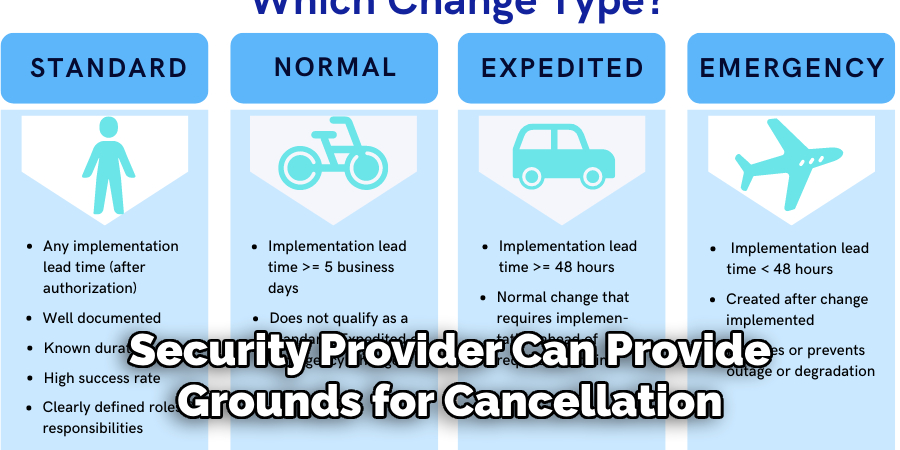Many homeowners opt to install security systems to safeguard their properties, but situations can arise where they wish to end their current contracts. Common reasons for wanting to exit a security system contract include dissatisfaction with the service provided, a desire to switch to a different provider offering better terms, or financial constraints that make ongoing payments untenable. However, breaking such agreements is not always straightforward.

Most security system contracts are designed to lock in customers with penalties or fees for early termination, complicating efforts to cancel. This article aims to provide actionable advice on how to get out of a security system contract legally and affordably. It will also explore alternative solutions that might circumvent the need to break the contract, ensuring that you remain protected and financially stable.
Review the Contract Terms Carefully
Before attempting to cancel your security system contract, it’s crucial to thoroughly review the contract terms to understand your options and any potential barriers to cancellation. Begin by locating your original contract or agreement with the security provider. This document holds the essential details of your contractual obligations. As you examine the contract, pay close attention to key clauses, such as the duration of the contract and any restrictions on termination.
Specifically, identify any early termination fees that could significantly impact the affordability of ending the contract. These fees typically vary based on how much time remains on the contract, often calculated as a percentage of the remaining term’s payments. Moreover, check for any auto-renewal clauses to understand if they might automatically extend your contract beyond the expected end date. Another critical aspect to investigate is whether the contract includes a cooling-off period.
This period allows for cancellation within a brief timeframe, usually between 3 to 7 days after signing, without incurring penalties. Understanding these clauses and fees is vital to strategizing your approach to terminating the contract legally and financially soundly.

How to Get out Of a Security System Contract: Explore Legal Grounds for Breaking the Contract
A. Changes in Service
Contracts are legally binding agreements, so any unauthorized changes by the security provider can provide grounds for cancellation. If the company alters the terms of service without your consent—such as increasing fees or reducing service quality—this might constitute a breach of contract.
This lack of notification and alteration of initial agreements may legally empower you to cancel without facing penalties. In addition, persistent service issues, such as technical malfunctions, frequent outages, or inadequate response to service inquiries, can be deemed as a failure to fulfill the provider’s contractual obligations. Documenting these issues can support your case for an early termination without financial repercussions.
Maintaining records of communication attempts and unresolved technical problems strengthens your argument that the provider has not upheld their end of the contract, allowing you to exit the agreement on legitimate grounds.

B. Moving to a New Location
Relocating to a new residence can complicate security system contracts, but some contracts provide relief. Check if your contract includes a relocation clause, which might allow you to terminate the agreement without penalty if the provider cannot deliver services at your new address. This clause is especially relevant if you’re moving to an area outside the provider’s coverage.
If the contract doesn’t support outright cancellation, explore the possibility of transferring the contract either to your new address or the future homeowner, should you be selling your home. Some providers offer flexible relocation options, such as transferring the service to a new location with added installation fees. Understanding the specific relocation policies in your contract can save you from unnecessary costs and provide a smoother transition during your move.
C. Military Deployment
Military deployments introduce unique challenges, but the Servicemembers Civil Relief Act (SCRA) protects active duty members. Under SCRA, military personnel can terminate certain contracts, including security agreements, without facing penalties if they receive deployment orders for more than 90 days or are required to relocate due to a change of duty station.

To utilize these protections, active duty members should provide the provider with written notice and a copy of the official military orders. This law is designed to alleviate the burdens of civilian obligations, ensuring that service members can focus on their duties while retaining financial stability. If you find yourself in this situation, it’s essential to communicate with your provider as soon as possible to facilitate an agreement in accordance with the SCRA, ensuring that your contractual obligations align with your military responsibilities.
How to Get out Of a Security System Contract: Negotiating with Your Security Provider
Initiating direct communication with the provider when seeking to cancel a security system contract can be a crucial step toward a favorable resolution.
Contact Customer Service
Begin by contacting the company’s customer service department either via phone or email. Clearly express your desire to cancel while maintaining a polite yet assertive tone. Establishing a respectful dialogue often facilitates a more cooperative negotiation process.
Negotiate Early Termination Fees
Discuss the possibility of reducing or waiving the early termination fee. Highlight any long-term loyalty or past service issues as potential leverage points. A history of timely payments and responsible usage may encourage the provider to accommodate your request, especially if they wish to retain you as a potential future customer.
Ask About Buyout Programs
Inquire if your security provider offers any buyout programs specifically designed for customers interested in switching to another company. These programs may cover a portion of your cancellation fees as an incentive to transition your service, offering financial relief as you seek better terms or services elsewhere.

Offer to Transfer the Contract
If you’re relocating, suggest transferring the contract to a new homeowner or renter, which might appeal to the provider as a practical solution. Many companies are open to contract transfers as a means to retain service continuity and customer satisfaction.
Examine Alternatives to Canceling
Exploring alternatives to outright cancellation can provide feasible solutions while maintaining service continuity. One potential option is to suspend or pause the contract. Some companies offer the flexibility to temporarily suspend services without penalties, which is ideal if you’re uncertain about a full cancellation due to short-term changes in your circumstances. This can be particularly beneficial if you’re traveling or facing temporary financial constraints, as it prevents the need for a full cancellation while reducing costs in the interim.
Another consideration is to downgrade your service. If financial limitations are prompting you to consider cancelation, explore the possibility of switching to a less comprehensive or more affordable service plan. Many providers offer tiered plans that allow for cost savings without entirely severing service, enabling you to manage expenses more effectively.
Lastly, for those relocating to a new residence, discuss relocation options with your provider. Some companies may install the security system at your new address with minimal charges or potentially no cost, allowing service continuation in your new home. Understanding these alternatives can provide a smoother transition, ensuring that your security needs are still met even as circumstances change.
Leverage State and Federal Laws
Understanding and utilizing state and federal laws can empower you when dealing with security system contracts. Consumer protection laws in many states are designed to safeguard customers from unfair practices, such as contracts that impose excessive penalties for early termination. To ensure you are well-informed, research your state’s specific regulations. The website of your state’s attorney general’s office is a valuable resource for discovering applicable local laws regarding security contracts.
In addition to state laws, federal regulations also offer protection for consumers. The Federal Trade Commission (FTC) provides resources that can be instrumental in situations where a company may be engaging in deceptive or misleading practices. One important regulation is the FTC’s “Cooling-Off Rule,” which grants consumers the right to cancel certain purchases within three days. This rule applies if you bought the security system in person at a location other than the seller’s permanent place of business. Leveraging these legal protections can be decisive when you need to cancel a contract, ensuring that your consumer rights are respected and upheld.
Avoiding Auto-Renewal
To prevent being locked into another term with your security provider, it’s crucial to check your contract for any automatic renewal clauses. These clauses often extend your contract for an additional year or more once the original term ends. To avoid this, ensure you provide written notice to the company indicating your decision not to renew the contract.
Pay close attention to the notice period stipulated in your contract, as most companies require you to notify them 30-60 days before the renewal date. Make sure you document all aspects of the cancellation process. Keep copies of written communications, including your cancellation request, which proves your intent to cancel. Thorough documentation will aid in resolving any disputes that may arise if there is a disagreement about the renewal status of your contract.
Conclusion
Navigating how to get out of a security system contract requires a strategic approach and thorough preparation. Start by reviewing your contract terms to understand your commitments and any early termination clauses. Explore legal options to leverage consumer protection laws and effectively negotiate with your provider to potentially reduce penalties.
Document every step of the process meticulously, from written communications to phone call notes, ensuring a clear record to support your case. Understanding your rights as a consumer is crucial; proactive familiarity with state and federal regulations can empower you to challenge unfair practices successfully. While breaking a contract may seem daunting, these steps can facilitate a smoother transition. By negotiating diligently and verifying your legal protections, you can confidently manage the process, preserving your financial interests and potentially easing future dealings with service providers.

